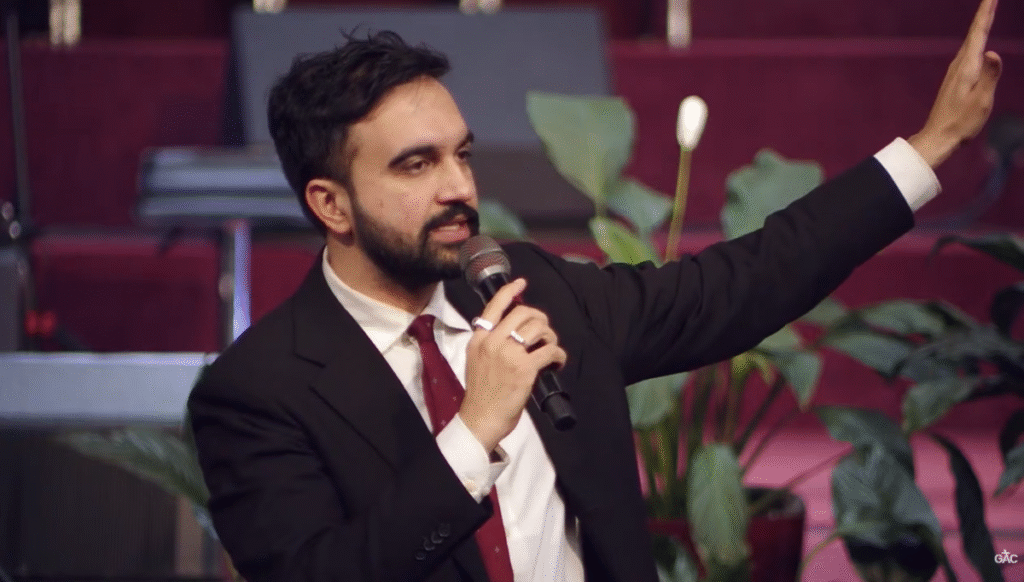Zohran Mamdani, the radical Muslim socialist running for New York City mayor, is at the center of a controversy over the use of faith to win votes.
Mamdani’s campaign has leaned on religious language and sympathetic portrayals of faith leaders to broaden appeal. Social posts and circulated images have suggested that Christian and Jewish clergy are warming to his platform. That tactic isn’t new; politicians often try to borrow credibility from faith communities, but the specifics matter when the platform is socialist and transformative.
When religious figures appear to endorse candidates whose policies demand sweeping economic and cultural change, red flags go up for many conservatives. Socialism, as a governing philosophy, tends to prioritize collective solutions and large-scale state intervention. Those priorities can clash with the traditional conservative emphasis on personal responsibility, private charity, and religious institutions operating independently from state control.
It’s reasonable to ask what endorsing a socialist means for a spiritual leader’s flock. Congregations expect moral guidance and spiritual care, not political recruitment. When pastors or rabbis step into partisan roles, they risk turning houses of worship into political outposts and confusing spiritual authority with political advocacy.
There’s also a practical side to consider: socialist policies often expand government power over everyday decisions, including how social services are delivered and how families manage their finances. For faith communities that run charities, schools, and social programs, that expansion can come with new regulations and oversight that limit how they help people.
Campaigns have learned the optics game well. A single well-placed photo or a short clip of a cleric offering a kind word can be amplified into the impression of broad religious support. That impression can mask serious policy differences between the candidate’s proposals and the teachings many congregations hold dear about stewardship and freedom.
From a conservative standpoint, religious liberty is not just a slogan; it’s a practical safeguard that lets churches, synagogues, and nonprofits operate according to their beliefs. Leaders who advocate for policies that expand government control over private institutions need to be clear about trade-offs. Voters deserve honest conversations about whether proposed policies will strengthen or weaken religious freedom.
There’s also a moral argument at play. Many faith traditions teach about the dignity of work, the importance of the family unit, and the need for voluntary charity. Those values can sit uneasily next to a political agenda that centers redistribution and top-down planning. That tension is worth examining whenever a candidate frames socialist proposals as simply compassionate or faith-aligned.
Democratic politics often rewards symbolism, but symbols shouldn’t substitute for substance. Voters should look past staged endorsements to the candidate’s record and stated priorities. Does the campaign promote economic policies that create opportunity and protect liberty, or does it push for centralized control that may limit both?
Religious leaders who take political stances should be prepared to explain how those positions square with their spiritual commitments. Congregants have a right to know whether their leaders are advancing gospel-aligned care and charity or lending institutional prestige to partisan goals. Transparency matters for trust within any faith community.
From a Republican angle, the concern isn’t just about one race in one city; it’s about the precedent set when faith communities are asked to bless sweeping ideological shifts. If religious endorsement becomes a routine tactic to normalize radical policy change, the public square loses a space where spiritual convictions can speak to civic life without being co-opted.
That’s why conservative voters should be skeptical of quick endorsements and curated social media moments. Ask questions about policy details, potential consequences for religious institutions, and the practical effects on families and local charities. Those are the issues that determine whether a campaign respects the role of faith in civic life or exploits it for political gain.
Ultimately, political campaigns that lean on faith to win votes owe communities more than image management. Faith leaders should be accountable when they step into partisan advocacy, and voters should insist on clarity about how proposed policies align with the values religious people hold dear. The stakes are real for religious freedom and civic order, and that deserves sober attention from everyone involved.



